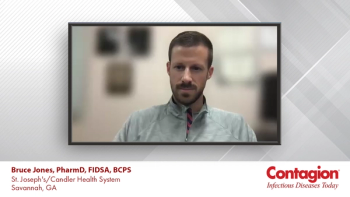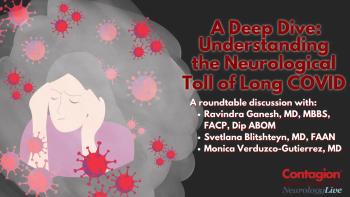
The complex and often frustrating realities that patients face when dealing with a post-infection condition that remains misunderstood by many continue to unfold.

The complex and often frustrating realities that patients face when dealing with a post-infection condition that remains misunderstood by many continue to unfold.

Amesh A. Adalja, MD, FIDSA outlined the importance of recognizing antibiotic resistance in healthcare settings, educating patients on responsible antibiotic use, and the need for new treatments and diagnostic tools.

Jacinda Abdul-Mutakabbir, PharmD, MPH, AAHIVP, discusses her work on the Equity in Antimicrobial Stewardship Efforts (EASE) framework, including progress for it, and how other institutions or providers can implement it.

In this conversation, Jones discussed looking at the benefits around choosing 1 specific therapy for treatment.

With melting ice and the release of ancient viruses, there are concerns around the emergence of potentially unknown infectious diseases. Emily Jenkins PhD, DVM, BScHon, offers insights on “zombie viruses” and says polar bears might hold the key to understanding what lies ahead, and how a One Health approach may help in surveillance and prevention.

This bacteremia can present heterogeneously and be difficult to contain, especially in an older patient population. Daniel B. Chastain, PharmD, BCIDP, AAHIVP, FIDSA, reviews the data of this class of therapies and how it may be clinically beneficial in combination with other antimicrobials.

Combining over 1,000 human antibodies, GIGA-2339 aims to achieve viral clearance and activate the immune system, offering a potential solution where current therapies fall short of providing a cure.

Bruce Jones, PharmD, FIDSA, BCPS offered clinical considerations for the concerns around infective endocarditis and when choosing empiric therapy.

Kenneth Lawrence, PharmD, discusses the global problem and the need for a layered, multifaceted approach to antimicrobial resistance (AMR) and some of the ongoing inroads and progress being made to address the medical issue.

Robert H. Hopkins, Jr., MD, medical director, National Foundation for Infectious Diseases (NFID) and ACIP liaison, offers guidance and insights on a variety of respiratory vaccines.

Bruce Jones, PharmD, FIDSA, BCPS provided insights on challenging patients with comorbidities such as type 2 diabetes and higher BMI.

Paul Feuerstadt, MD, FACG, AGAF, discusses what the data says as well as offers insights about what patients can expect and medical peer-to-peer information about the procedure.

Arbutus CEO Michael McElhaugh discussed trial results showing that a combination of imdusiran, an RNAi therapeutic, and pegylated interferon alfa-2α can achieve a functional cure in chronic hepatitis B patients.

Sakoulas offered his insights for when he considers discharging patients and strategies to avoid readmission.

The country’s largest fecal distributor, OpenBiome, could be prevented from offering the product next year if the FDA does not approve the product used for fecal microbiota transplants to treat fulminant C difficile.

In this conversation, Sakoulas discusses a specific therapy indicated for CABP.

George Sakoulas, MD, offered clinical considerations for treatment selection.

Chad Costley, MD, MPH, discussed the platform's ability to respond to emerging respiratory diseases and the challenges in advancing mucosal vaccine development for health preparedness.

Chad Costley, MD, MBA, provided an update on BlueWillow Biologics' NanoVax intranasal vaccine for H5N1, with Phase 1 trial data showing broad immune responses and no serious adverse events.

George Sakoulas, MD, provided commentary on challenging patients with comorbidities such as COPD, structural lung disease, asthma, and other health issues.

The combination of the antiviral agents islatravir and lenacapavir demonstrates both efficacy and safety, leading to advancement into Phase 3 trials.

Despite advances in understanding and treating Long COVID, many questions about its mechanisms, susceptibility, and varied recovery patterns remain unresolved, underscoring the need for continued research.

A study of carbapenemase-producing organisms found similar rates of infections, highlighting treatment challenges, the role of rapid diagnostics, and surveillance on antimicrobial stewardship due to high mortality rates.

Deborah Birx, MD, and Amy Carenza, BBA, highlight the targeting of multidrug-resistant organisms and tracking of infection trends without increasing staffing needs.

Led by Shruti K. Gohil, MD, MPH, the trials examined how computerized physician order entry prompts can reduce the use of extended-spectrum antibiotics in hospitalized patients while maintaining patient safety.

ActivePure’s Deborah Birx, MD, and Amy Carenza, BBA, discuss their study showing a 99% reduction in fungal colony-forming units, 98% reduction in aerobic bacteria, and a 66% decrease in C auris.

New approach targets multiple strains, promising broad protection against human, avian, and swine influenza viruses.

Sohaib Asghar, MBBS, MD, highlights the role of socio-economic factors and demographic disparities in HIV mortality from 1999 to 2023.

Clinicians discussed the complexities of diagnosing Long COVID, emphasizing the need for improved biomarkers and diagnostic technologies to better serve affected patients.

Buddy Creech, MD, MPH, assures that the interim findings of the study indicate adolescents produced a stronger immune response compared to adults, with minimal adverse effects.